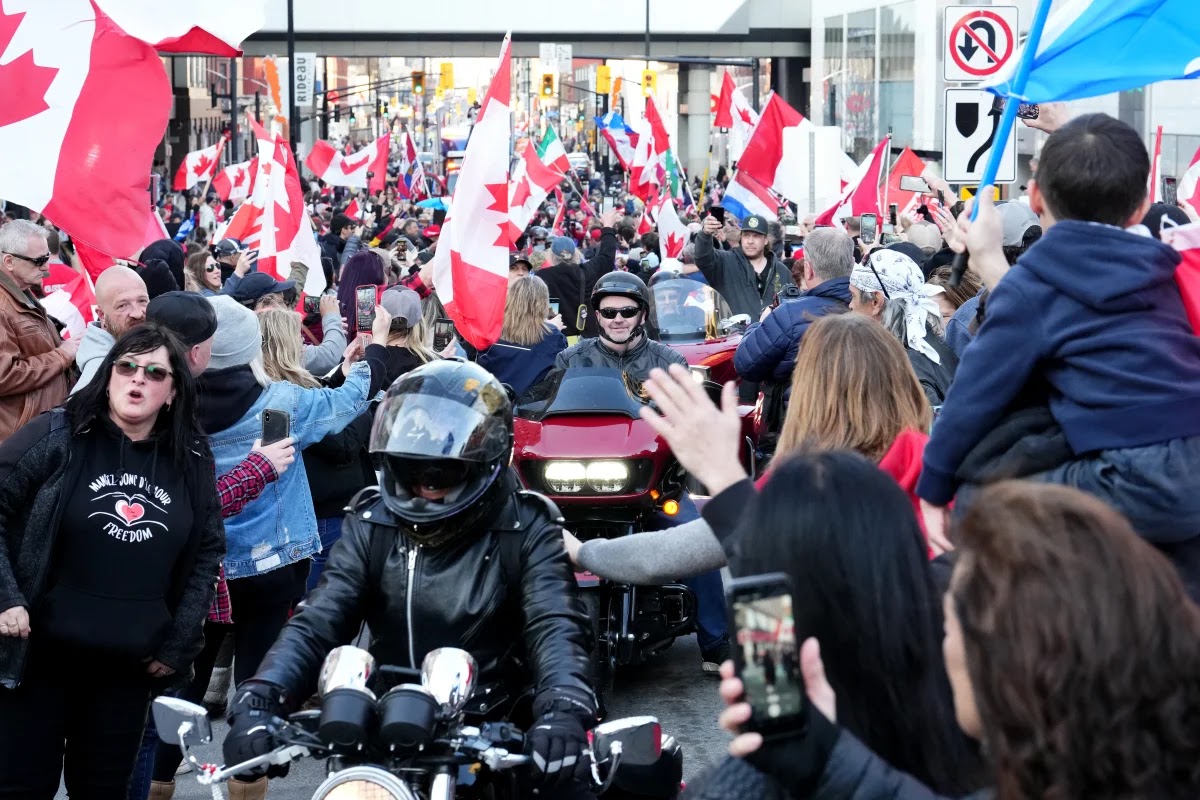Flag Wavers
We were again treated to images of flag wavers calling for their rights and freedoms on the streets and lawn in front of the Parliaments buildings in Ottawa. Driving through the Okanagan recently, we passed a few pickups covered in stickers calling for freedom and unity with a minimum of two Canadian giant flags secured by poles to the back of their truck beds. Anywhere they can fit them. Canadian flags and calls for freedom, freedom, freedom. My wife referred to them as clown trucks.
I have to agree with her to an extent. Anyone with any connection to world has seen what’s going on in Ukraine. Someone invades your country with the goal of putting in a puppet government and robbing you of all your rights to sovereignty and suddenly you’re no longer a citizen of that country. You’re a province of another. All your democratic rights are gone along with your right to self-determination and all the loss of freedom that entails.
People around the world connected the Ukrainian flag with freedom. During demonstrations held in cities across the globe, they waved the yellow and blue striped flag and posted it beside their names on social media. Now, that’s fighting for freedom but is it the same freedom the dudes in the Okanagan believe they’re fighting for?
Probably, the best action to take would be to talk to them but I haven’t. Perhaps, I could have chased one of the pickups down the highway hoping for a conversation. But, I didn’t. I’ve googled “why do people in the freedom convoy wave Canadian flags” and got a bunch of news stories and speculative articles by academics but nothing from the people who actually wave the flags.
I know that politics as a topic of conversation has become incredibly divisive almost everywhere in the western world. People have become motivated by hatred and fear rather than a common goal that they may all want to achieve. Like improving everyone’s standard of living or providing a better healthcare and education. That would be a reason to wrap yourself in a flag.
We need to think more on an individual and global context. What makes us happy? It can’t be hating others, resenting others, wanting what others may have or what they may want. We don’t all have to be the same. Hasn’t that been the beauty of Canada? Our ability to absorb other cultures and tolerate their differences.
A distinction needs to be made between tolerating differences and liking those differences. We don’t even need to understand them. All we need to do is accept that they exist. For example, as a heterosexual male, I don’t have to understand the attractions felt by those in the LGBTQ+ community but I should accept that they exist.
What difference does it make to me if they are given legal status to marry? None really. My marriage doesn’t suddenly lose legitimacy. It's still a marriage that possesses the legitimacy that I grant to it. The LGBTQ+ community has nothing to do the legitimacy or legality of our relationship because it’s between us. The same would be true of relationships based on other attractions.
A similar question could be asked about others’ rights to dress as they please or as their religion commands. Should Muslim women want to wear headscarves or burqas or whatever else, their choices have no impact on me. I don’t have to understand their religious choices just like I don’t have to understand fashion choices not based on religious precepts. They just don’t have to have an impact on me.
Political leaders like Vladimir Putin, Victor Orban, and Marine Le Pen have all secured power by exploiting the fear of others. They all believe their countries embody Christian values that are threatened by outside influences. In the case of Putin, it’s the gender fluidity and cancel culture promoted in the West and led by the U.S. He seeks to maintain the purity of the Russian people and by extension, the people of Ukraine who he sees as Russian and in the process of being corrupted by the West.
Victor Orban also fears gender fluidity and immigration threaten the innocence of his country and their way of life even though Hungary has accepted few immigrants within its borders. Marine Le Pen recently lost the French presidential race to Emmanuel Macron by a margin of 9%. She improved her popularity from her last presidential bid by toning down her anti-LGBTQ+ rhetoric while maintaining playing up the threat posed to French society by immigration and, in particular, the Muslim community.
In democracies such as Canada that embody a rule of law, we shouldn’t be threatened by groups we don’t understand. For better or worse, our rights of association are protected under the constitution. We can be who we want so long as it doesn’t threaten others. And this makes sense in the global context.
Globalization has increased prosperity of everyone on the planet. Scientific knowledge has increased profoundly as have advances in technology and medicine. Globalization has also created damage to the environment never before seen on the planet. All countries and citizenry need to work together, as a planet, to tackle this problem.
That’s why, we must each, look to ourselves for identity, an identity that won’t be threatened by those who are different. When I look at the Canadian flag, I don’t see a white, Christian nation that is threatened by those who are different. I see a nation that tolerates others and protects my rights and their rights from interference by others, that believes in the rule of law that applies to everyone equally with leaders who are elected by a fair and transparent democratic process. That’s the flag that I’ll wrap around myself in and I’ll fight for the right of others to do the same.




In light of your very salient words i worry that what the Canadian flag stands for is now diminished by its disingenuous use by the flag wavers.
ReplyDeleteMe too
Delete